#superintendent of penitentiaries
Text
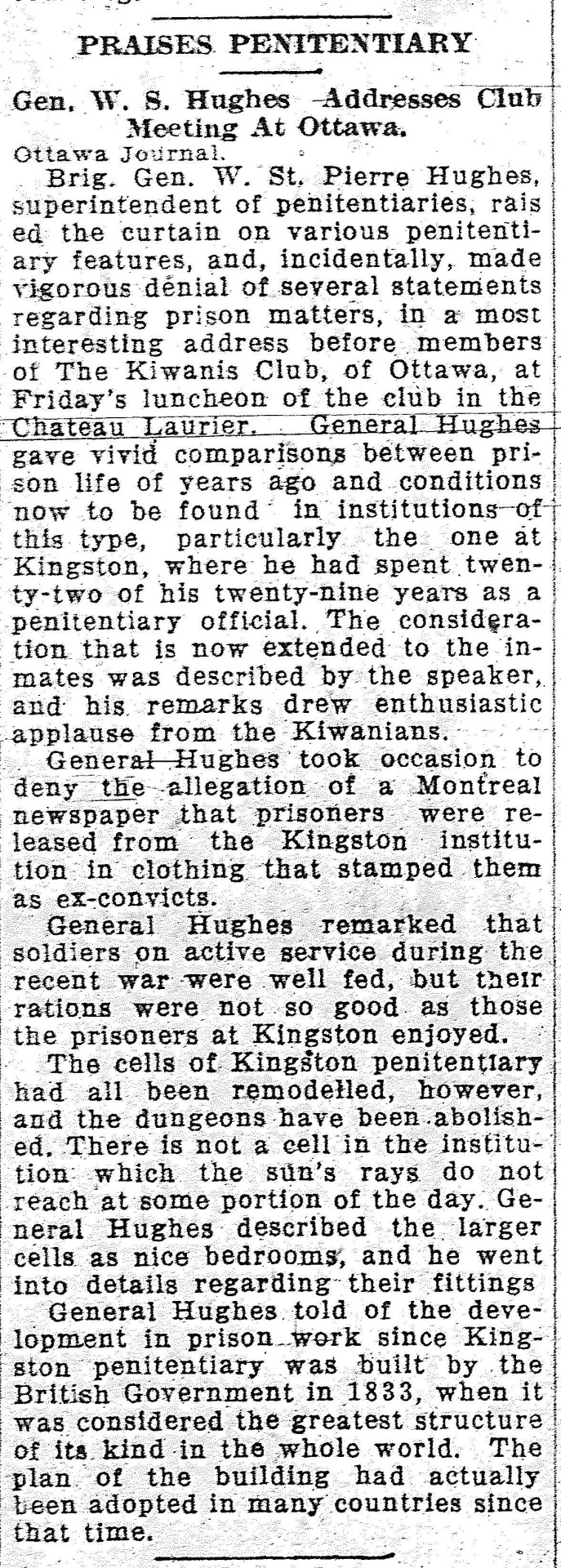
"PRAISES PENITENTIARY," Daily British Whig (Kingston, Ontario). September 20, 1920. Page 2.
---
Gen. W. S. Hughes Addresses Club Meeting At Ottawa.
----
Ottawa Journal.
Brig. Gen. W. St. Pierre Hughes, superintendent of penitentiaries, raised the curtain on various penitentiary features, and, incidentally, made vigorous dénial of several statements regarding prison matters, in a most interesting address before members of The Kiwanis Club, of Ottawa, at Friday's luncheon of the club in the Chateau Laurier. General Hughes gave vivid comparisons between prison life of years ago and conditions now to be found in institutions of this type, particularly the one at Kingston, where he had spent twenty-two of his twenty-nine years as a penitentiary official. The consideration that is now extended to the in- mates was described by the speaker, and his remarks drew enthusiastic applause from the Kiwanians.
General Hughes took occasion to deny the allegation of a Montreal newspaper that prisoners were released from the Kingston institution in clothing that stamped them as ex-convicts.
General Hughes remarked that soldiers on active service during the recent war were well fed, but their rations were not so good as those the prisoners at Kingston enjoyed. The cells of Kingston penitentiary had all been remodelled, however, and the dungeons have been abolished. There is not a cell in the institution which the sun's rays do not reach at some portion of the day. General Hughes described the larger cells as nice bedrooms, and he went into details regarding their fittings
General Hughes told of the development in prison work since Kingston penitentiary was built by the British Government in 1833, when it was considered the greatest structure of its kind in the whole world. The plan of the building had actually been adopted in many countries since that time.
#ottawa#kingston ontario#kingston penitentiary#kiwanis#chateau laurier#superintendent of penitentiaries#w. s. hughes#penal reform#prison administration#1920 kp rcmp investigation#crime and punishment in canada#history of crime and punishment in canada#dominion penitentiaries
1 note
·
View note
Text


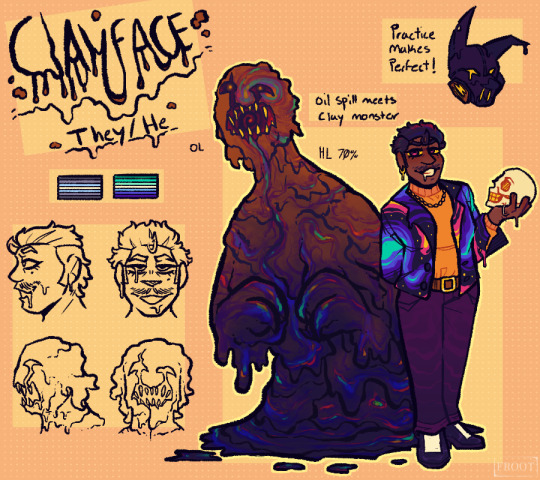
(most of) The sewer squad!
Surprisingly, Clay and Croc were super fun for me to color. Rat was the one that kicked my ass this time
(P.S. sorry about the lore being so long down there)
Waylon Jones was originally born in Louisiana. He was born into a relatively low income but very big, very loving family. He was also born with Epidermolytic Ichthyosis, which caused patches of his skin to blister or thicken, sort of like scales. This would be the first thing he'd be bullied for as a child, and it would only grow worse as he went through school and his undiagnosed ADHD and dyslexia would make it ten times harder for him. He would eventually decide to drop out of school, both because of his learning difficulties and the bullying.
One thing Waylon had always loved was boxing. His father had taught him and all of his siblings the basics of boxing, and Waylon was one of the ones who really took a shining to it. It helped that he was a naturally bulky guy who could put on muscle pretty easily. So now that he was out of school, he decided to put his free time towards participating in amateur boxing matches. It didn't rake in very much money, and usually took place in some guy's backyard or a junkyard, but he thought it was a lot of fun - and, most of all, he was good at it.
He made the choice to move to Gotham after he'd collected enough money to start a life somewhere else. He loved his family, and it hurt to move away from them, but a big city like Gotham provided more opportunity than backyard brawling. And indeed, it did! He graduated from probably illegal homemade boxing matches to actual, professional matches - still nothing above amateur, but it was something, and it made a lot more money!
It was during this time when he'd gain the nickname Killer Croc, from a combination of his skin condition, how big he was, and where he'd been born. (He didn't actually kill anyone though, he was a sweetie. He's just killer at boxing).
Things started going downhill for him when he finally won enough matches to go up against another relatively popular name in the amateur boxing league. This opponent, not wanting to lose against what was still a fresh face in Gotham, conspired to cheat in order to win. Because it's Gotham, and anyone can be made to look the other way, no one caught the man as he mixed plaster of Paris with his hand wraps (which hardens into something similar to concrete) before the match.
Safe to say, Waylon lost the fight pretty badly. While he would have been a good sport about it, he knew that who he'd fought had cheated, and he was pissed. As soon as he was out of the hospital, and his face was healed enough for it, he caught the other boxer as he was leaving the gym. He tried to convince him to admit that he had cheated and forfeit his win, but they'd end up getting into an argument that'd turn physical when he tried to punch Waylon.
When the cops arrived, instead of breaking up the both of them and taking them both in, they instead arrested just Waylon. Because the other boxer chose to press charges, Waylon was shipped off to BlackGate Penitentiary after a hasty trial. But he didn't stay there for very long.
Doctor Hugo Strange, head of Arkham Asylum, had followed Waylon's arrest closely in the news. He took an interest in the boxer specifically because of the irony of his nickname. Strange would go on to convince the superintendent of BlackGate that Waylon was unfit to be housed in a regular prison because of how dangerous he might be - Arkham would be a much better fit for him.
Strange promised Waylon that being in an asylum would greatly reduce how long he'd have to spend incarcerated, as he could get out of an asylum when he was proven "sane". But Waylon was given a cell in the lowest pits of Arkham - in the basement, where Strange made his monsters. And he would become the living test subject for what would become Kirk Langstrom's own bat-serum; his nickname, Killer Croc, once a source of pride, becoming a cruel prediction of what he'd become.
Unlike Kirk, however, Waylon is permanently trapped in this new form; shunned from society and now living as Gotham's monster in the sewers. Forever a Killer Croc.
??? (Nickname: Rat/Rats) was born in....Well, actually, no one really knows where it came from. Rats was there the first time Waylon escaped into the sewers, and it seemed it'd been there a long time before that, too.
Rats is like a cryptid to most of the Gotham population. But, like, the kind of cryptid where everyone knows it's real, you just don't encounter it that often. 12 year old rat child in the sewers? Yeah, everyone knows about that
They're shy, unnerving, and tend to be nonspeaking, their only appearances to most of the public coming from brief glimpses in the sewers or, occasionally, guiding people lost within them back out.
To the rogues, though, Ratcatcher is a source of information. It seems to know far more than it should, due to communication with the all-seeing eyes of it's many rats. But how much it's willing to help depends on how much it trusts you, which is usually not very much at all.
And if they don't want to talk to you, then Waylon will be sure to escort you quickly out of the sewers.
(Fun fact: Rats communicates mostly in ASL!)
Basil Karlo was born and raised in Gotham. A lover of performance from the moment he could join the theatre club in school, he was dead set on pursuing an acting career after he graduated from college. His first experiences were small background roles or roles in commercials, but even then directors could see the acting potential lurking within him.
Small roles grew into more major roles, as they grew from background actor, to minor actor, to eventually starring in major roles. And they were a popular guy! Pretty face, charming voice, they became Gotham's own star!
In one of these movie roles, Basil would grow very close to one of his co-stars. Their relationship would move very quickly from friendship to romance, as it does when you work so closely with someone. It might have even moved a little too fast, as they decided to get married the moment they returned to America from their filming location. She moved into his home in Gotham, and things were good, for a little while.
But a lot of cast romances end up not working out, and this was one of those cases. Basil and his wife began to drift apart, focusing on their own careers and neglecting one another in the process. Their relationship began to decay, and with the nature of Basil's career, there began to be...people on the side.
They thought he kept these escapades a secret. They did everything they could to not let their wife or the public know about their cheating.
Of course, this was a pipedream.
This all happened around the time J's Red Hood Gang was at their peak. They figured out Basil's secret, gathered material, and would present the evidence to Basil himself. To keep their secret safe, Basil was forced under the Red Hood.
Basil...did not take well to what he had to do as a Red Hood. But he was desperate to save face amongst the well-to-do of Gotham, so he continued doing the bidding of J and her gaggle for a good while.
Until the day, with no interference from the Red Hoods, their wife left them. She had apparently been contacted by one of Basil's partners, and now they were going to leak that to the press during the divorce proceedings.
Basil's life was ruined. His reputation was in shambles, and he was doing more work for criminals than directors. But he decided he was going to change that. What was the point of working as a Red Hood if they had no way to blackmail him anymore?
So they attempted to leave. They confronted J and demanded that she let them go, and without waiting for her response, left.
Red Hoods were waiting at their home when they got back there. They kidnapped them, dragged them to Ace Chemicals, and proceeded to pour an experimental chemical onto their face. This chemical made flesh like clay—moldable, which the Hoods used to their advantage as they toyed with Basil's face. Morphing it into different shapes and expressions for their own amusement.
When they were done, they dragged him to the vat where they were developing that chemical and threw him into it, expecting him to die.
Unfortunately for Basil, they did not.
#frootverse#waylon jones#killer croc#ratcatcher#basil karlo#clayface#batman#rogues gallery#my art#rogue design
264 notes
·
View notes
Text
It's 1932, the state penitentiary. Will Graham is the block superintendent, but not because he wants to be, per se; old Jack Crawford wouldn't quit knocking on his door until Will had agreed to fill the position. Some spiel about saving lives by keeping the killers in check. Jack Crawford never cared that it was a bad place for Will to be. That Old Sparky haunted his dreams, that he could feel every vile thought that walked through each cell door, as if it were his own bad taste in his mouth, or that the sizzling sound of death satisfied him more than it ought have.
No one cared, really, until the year Hannibal Lecter had been admitted to Cell Block E. Then, all at once, it started to seem like everyone cared a little too much--Hannibal most of all.
#hannigram#hannibal#so this isnt rlly anyting i plan on working on BUT ive been reading the green mile in my free time#and thus a plot very vaguely based on the green mile was born lol#basically Will is superintendent of cell block e and oversees criminal executions#hannibal is a very handsome inmate who sees will a lil too well
7 notes
·
View notes
Text

2024-04-05: Parchman Farm (Prison Settlement)
Parchman Penitentiary, more commonly known as Parchman Farm or simply Parchman, was founded at the turn of the century and has become a sprawling prison farm. The woods on the property had been cleared a decade ago, and now those incarcerated here labor at cultivating food to feed themselves and cotton to feed the hungry coffers of the state. Called as the prison without bars, only a wire fence and the occasional patrolling guard on horseback separates the inmates from the outside world.
A little under 2,000 people are incarcerated here: men and women, black and white. All are strictly segregated.
In addition to selling cotton, Parchman makes money by leasing out the prisoners for work. You have a big and unpleasant job that needs to be done? Hire convicts if you have enough money and clout. Try to bring them back in mostly one piece, but the state knows that sometimes "things happen."
Parchman doesn't allow executions. Not yet, anyway. Those condemned to die are sent back to their counties of conviction when it's time for the reaper to come collect his due.
Points of Interest
Superintendent's House
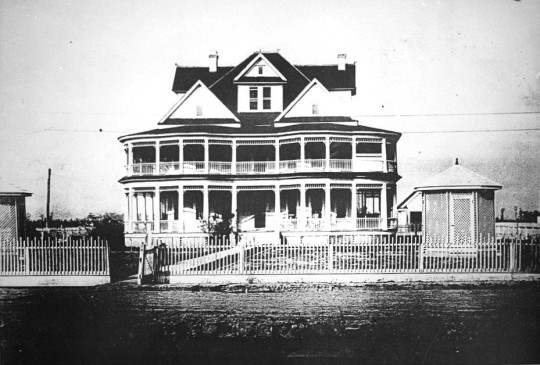
A sprawling three-story building in the Queen Anne style surrounded by a white picket fence is home to Parchman's superintendent and his family. The more trustworthy, lower security prisoners are often tapped to do housekeeping and maintenance as servants, but they still have to go back to the prison camp each night. Working in the house is the most plum job an inmate can get at Parchman, and there's a lot of political maneuvering both inside and outside the house to decide who gets to work here.
Prison Camps
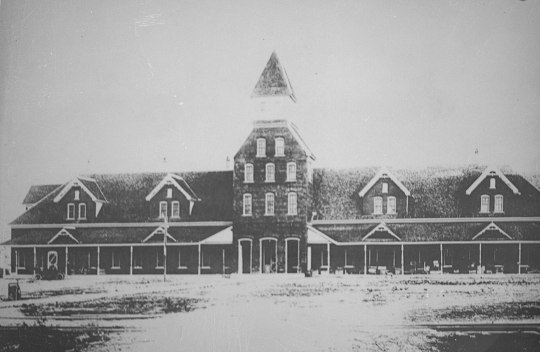
The penitentiary is divided into a series of camps scattered across its 28 square mile property. Despite being called a camp, these are large, sturdy facilities that look more like a schoolhouse or church than a cluster of tents or cramped shanks. Parchman has a total of 13 camps: 12 for men, and a single one for women. Every camp is separated by race.
Camp 13 is the area designated for Black women, and it differs from the others in function. Long benches and banks of sewing machines make up a work area for the incarcerated women to spend long days making clothing. They assemble uniforms for the prisoners and guards, but other big sewing jobs occasionally pop up, too.
Fields
youtube
From sunup to sundown, inmates toil in the fields. Long work songs carry on the hot humid breezes, helping the laborers keep a steady rhythm to their work. Most of the land is for growing cotton, which is picked by hand so the prickly bolls can make the task just a little more unpleasant. If the work songs don't have you moving, the rifle-toting guards are happy to provide extra motivation.
If you're not assigned to the fields, you might be clearing land or chopping firewood. Even though the prisoners are trusted with axes and other tools, a single prisoner with an axe is still no match for a bullet.
Speaking of bullets, many of the guards in the fields were actually some of the most violent convicts who were given guns and tasked with overseeing the operations in the field. These particular inmates were all convicted of murder and called the trusty-shooters. They brutalized the inmates as much, if not more so, than the non-incarcerated guards. All the inmates had knives, though, and it was only the threat of the sheer number of knives being used in retaliation that could keep an uneasy peace.
#hexplore24#fishdavidson#dungeons and dragons#hexcrawl#5e#settlement#prison#parchman#prison song#work song#alan lomax#Youtube
0 notes
Text
Newfoundland's Victorian-era jail will be replaced, but observers say it's unfit now
Newfoundland and Labrador is replacing its crumbling, Victorian-era jail in St. John's, but observers say the facility isn't fit to house people in the meantime.
Cindy Murphy of the local John Howard Society says government needs a plan to address the harsh conditions at Her Majesty's Penitentiary for the next few years until a new facility is constructed.
Emails obtained through access to information legislation show that inmates staged a protest at the facility in June, refusing to go back to their sweltering cells.
Fred Cumby, the jail's assistant superintendent, emailed the government the day after the protest to say that if something isn't done about the heat, "somebody is going to get hurt or worse."
Emails from July show that temperatures in some parts of the facility reached humidex values up to 36.
Halifax-based lawyer Mike Dull said in an interview that forcing inmates to endure days or weeks at temperatures that high could arguably constitute a violation of their Charter rights.
"There's much lesser conditions that have been found to amount to cruel and unusual punishment," said Dull, who is involved in a class-action lawsuit against the Newfoundland and Labrador government about the use of solitary confinement at Her Majesty's Penitentiary.
Dull said the people he's spoken to for that lawsuit have described "really horrific" and "demeaning" conditions at the facility, including unbearable temperatures in both winter and summer.
The oldest part of Her Majesty's Penitentiary was built in 1859, and the facility is among the oldest operating jails in the country. The provincial Department of Justice says construction on a new facility is expected to begin next spring.
This report by The Canadian Press was first published Nov. 28, 2022.
from CTV News - Atlantic https://ift.tt/SnW8TtX
0 notes
Text
Monday, August 1, 2022
Trained, Armed and Ready. To Teach Kindergarten.
(NYT) Mandi, a kindergarten teacher in Ohio, had already done what she could to secure her classroom against a gunman. But after 19 children and two teachers were killed in Uvalde, Texas, she felt a growing desperation. So she signed up for training that would allow her to carry a gun in school. A decade ago, it was extremely rare for everyday school employees to carry guns. Today, after a seemingly endless series of mass shootings, the strategy has become a leading solution promoted by Republicans and gun rights advocates, who say that allowing teachers, principals and superintendents to be armed gives schools a fighting chance in case of attack. At least 29 states allow individuals other than police or security officials to carry guns on school grounds, according to the National Conference of State Legislatures. As of 2018, the last year for which statistics were available, federal survey data estimated that 2.6 percent of public schools had armed faculty. The count has likely grown.
Floods strike new blow in place that has known hardship
(AP) Evelyn Smith lost everything in the floods that devastated eastern Kentucky, saving only her grandson’s muddy tricycle. But she’s not planning to leave the mountains that have been her home for 50 years. Her family has lived in Knott County for five generations. They’ve built connections with people that have sustained them, even as an area long mired in poverty has hemorrhaged more jobs with the collapse of the coal industry. After fast-rising floodwaters from nearby Troublesome Creek swamped her rental trailer, Smith moved in with her mother. At age 50 she is disabled, suffering from a chronic breathing disorder. “I’ve cried until I really can’t cry no more,” she said. “I’m just in shock. I don’t really know what to do now.” For many people who lost their homes, connections with family and neighbors will only grow in importance in the aftermath of the floods, which wiped out homes and businesses and engulfed small towns. Still, in a part of the state that includes seven of the 100 poorest counties in the nation, according to the U.S. Census Bureau, they may not be enough for people already living on the margins. “People who are poor in east Kentucky are really some of the most disadvantaged people in our entire country,” said Evan Smith, an attorney with the Appalachian Research and Defense Fund. “And for those who have now lost vehicles, homes, loved ones, it’s hard for me to see how they bounce back from this.”
Gangs Advance on the Seat of Haitian Government Power
(NYT) Gangs are increasing their chokehold on Haiti’s capital, using bulldozers to raze entire neighborhoods, overwhelming poorly armed police and taking their violence to within blocks of the seat of government. While Haitians have endured relentless bloodshed and tragedy for years, the escalation of lawlessness in recent weeks and the government’s inability to exert control has terrified the nation. In just a nine-day period in July, more than 470 people were killed, injured or missing as a result of gang warfare in Cité Soleil, the country’s largest slum, according to the United Nations. Government agencies and ministries have urged employees to stay home as gangs expand their territory and are now close to the presidential palace, the interior ministry, the central bank and the national penitentiary, where hungry prisoners are threatening to riot, officials warn. In Cité Soleil, home to about 300,000 people, gangs fighting for control are using bulldozers to topple homes, gang-rape women and girls, and kill at random, according to interviews with residents.
As Latin America Shifts Left, Leaders Face a Short Honeymoon
(NYT) In Chile, a tattooed former student activist won the presidency with a pledge to oversee the most profound transformation of Chilean society in decades, widening the social safety net and shifting the tax burden to the wealthy. In Peru, the son of poor farmers was propelled to victory on a vow to prioritize struggling families, feed the hungry and correct longstanding disparities in access to health care and education. In Colombia, a former rebel and longtime legislator was elected the country’s first leftist president, promising to champion the rights of Indigenous, Black and poor Colombians, while building an economy that works for everyone. After years of tilting rightward, Latin America is hurtling to the left, a watershed moment that began in 2018 with the election of Andrés Manuel López Obrador in Mexico and could culminate with a victory later this year by a leftist candidate in Brazil, leaving the region’s six largest economies run by leaders elected on leftist platforms. But just as new leaders settle into office, their campaign pledges have collided with a bleak reality, including a European war that has sent the cost of everyday goods, from fuel to food, soaring, making life more painful for already suffering constituents and evaporating much of the good will presidents once enjoyed. “I don’t want to be apocalyptic about it,” said Cynthia Arnson, a distinguished fellow at the Woodrow Wilson International Center for Scholars. “But there are times when you look at this that it feels like the perfect storm, the number of things hitting the region at once.”
Maggie’s legacy: Divisive Thatcher looms over UK Tory race
(AP) Two people are running to be Britain’s next prime minister, but a third presence looms over the contest: Margaret Thatcher. The late former prime minister dominated Britain in the 1980s, and has left a large and contested legacy. Critics see her as an intransigent ideologue whose free-market policies frayed social bonds and gutted the country’s industrial communities. But for the governing Conservative Party, Thatcher is an icon, an inspiration and the presiding spirit who made Britain fit for the modern era. In the race to replace Boris Johnson as Conservative leader and prime minister, both Foreign Secretary Liz Truss and former Treasury chief Rishi Sunak claim to embody the values of Thatcher, who died in 2013 at 87. Asked who was Britain’s greatest prime minister? Both candidates unhesitatingly say Thatcher. Robert Saunders, a historian of modern Britain at Queen Mary University of London, believes “she has become a creature of myth.” “Like Thor’s hammer, Thatcher’s handbag can bestow godlike powers on those deemed worthy to lift it,” Saunders wrote on the Unherd website.
Ditch the necktie: Spain’s leader backs conserving energy
(AP) Spain’s leader has proposed an energy-saving move that many men have already embraced. Spanish Prime Minister Pedro Sánchez has asked government officials and people working in the private sector to save energy by giving up wearing neckties at work. Spain has sweltered for more than a month, with temperatures in parts of the country often surpassing 40 degrees Celsius (104 degrees Fahrenheit). The government has urged people to reduce electricity costs by not overusing air conditioning.
Drone explosion hits Russia’s Black Sea Fleet HQ
(AP) A drone-borne explosive device detonated Sunday at the headquarters of Russia’s Black Sea Fleet, injuring six people, officials said. The explosion at the headquarters in the city of Sevastopol on the Crimean peninsula that Russia annexed from Ukraine in 2014 caused cancellation of observances of Russia’s Navy Day holiday. The Black Sea Fleet’s press service said the drone appeared to be homemade. It described the explosive device as “low-power” but Sevastopol mayor Mikhail Razvozhaev said six people were injured in the blast. Fighting continued elsewhere in Ukraine.
U.S. House Speaker Pelosi begins Asia tour, no mention of Taiwan
(Reuters) U.S. House of Representatives Speaker Nancy Pelosi starts a tour of four Asian countries on Sunday, her office said, without mentioning Taiwan amid intense speculation she might visit the self-ruled island claimed by China. China views visits by U.S. officials to Taiwan as sending an encouraging signal to the pro-independence camp in the island. Washington does not have official diplomatic ties with Taiwan but is bound by law to provide the island with the means to defend itself. A visit by Pelosi would be a dramatic, though not unprecedented, show of U.S. support for Taiwan. Republican Newt Gingrich was the last House speaker to visit Taiwan in 1997. President Xi Jinping warned his U.S. counterpart Joe Biden on Thursday that Washington should abide by the one-China principle and “those who play with fire will perish by it”.
Part of Beirut port silos, damaged in 2020 blast, collapses
(AP) A section of Beirut’s massive port grain silos, shredded in the 2020 explosion, collapsed in a huge cloud of dust on Sunday after a weekslong fire, triggered by grains that had fermented and ignited in the summer heat. The northern block of the silos toppled after what sounded like an explosion, kicking up thick gray dust that enveloped the iconic structure and the port next to a residential area. The 50 year-old, 48 meter (157 feet) tall silos had withstood the force of the explosion two years ago, effectively shielding the western part of Beirut from the blast that killed over 200 people, injured more than 6,000 and badly damaged entire neighborhoods.
0 notes
Link
0 notes
Text

1 note
·
View note
Text
Admittance (Oneshot)
Based on research I've done. Some things might not be completely accurate, but it's the best I've got.
-1829-
Caolán (kee-lin) didn't know what he did wrong. He didn't steal, he didn't lie, and he didn't pick trouble, so why was he here? He was told America would be paved with gold, and he could have a good life, so why was he being dragged off by a police officer?
Before he knew it, they were in front of a large building, and he was shoved through the big door. Once inside, he was met with another burly man who asked him a question.
"What's your name, kid," he growled, not looking at Caolán's face, but right above it at his flaming red hair.
"Caolán," he said. A pause. "Sir."
"Enough for me. Take 'im inside," And Caolán was once again whisked away, this time to a room with lots of chairs and mirrors.
"Sit." the man who had pulled him here barked at him, and Caolán did.
He was pushed back in the chair, and a few seconds later felt scissors roughly chopping away at his hair.
"What're you- " he started.
"Quiet, boy!" a voice snarled from behind him. He tensed up, but shut his mouth.
Once his hair was cut very close to his head, he was pushed through another door. This one had a washtub in it, and yet another burly man standing beside it.
Caolán was given a firm shove towards the tub.
The new man handed him a washcloth and a bar of soap, and said, "In," and pointed to the tub.
And so Caolán got out of his clothes, and washed himself all over, all while under the watchful eye of the man.
Sometime when he wasn't looking, the man had switched the clothes he had taken off for new, crisp ones, and once he had looked behind his ears, handed them to him.
Caolán put them on, and from there was pulled through the door, and down a maze of hallways to yet another room. This room was a fully furnished office, complete with a painting of a scary old man, and a younger, alive man, both staring him down.
He was sat on a chair in the center of the room, and then the man who brought him left, leaving Caolán alone in the room with the scary man with eyes that pierced into him.
The man stayed silent, and the only sound that was in the room was the ticking of the clock, and the creaking of the floorboards as he slowly walked around him, eyes never leaving Caolán.
Caolán slowly shrunk into his chair, his heart beginning to race. Who was this man? What did he want with him? He had done nothing wrong, right? He had heard stories of this place, and none of them were good. It was a jail for kids. You got beatings like rich men got pennies. It was inescapable. You could be worked to death.
Those stories were the reason Caolán stuck to the shadows, and never did anything that could even possibly get him sent here. He followed every rule, he paid for what little he ate, and he was even friendly to what police he saw.
Maybe he said something wrong. All he said was 'Good day' though. How could that get him sent here? Maybe he wasn't supposed to say something at all.
After what seemed like forever, but was probably five minutes, the man broke the silence, making Caolán jump.
"There are two rules here that you must memorize. One, Never tell a lie, and 2, Do as well as you know how. Repeat those back to me."
"Never tell a lie, and do as well as you know how?" Caolán said.
The man cringed. "Good. We'll have to work on getting rid of that accent though."
Caolán was confused, but was given no time to think about it because the man kept on speaking.
"My name is Superintendent Hart, and I'm in charge around here. You do anything wrong, and you'll have to answer to me. Let's hope it won't come to that though. First, I'd like to get something out of the way. This institute is unlike any Penitentiary or State Prison, seeing as it is not a prison, but rather a reformatory for wicked and unfortunate children, such as yourself. Our goal is not to punish you, but turn you in the direction of good. But should you be disobedient, there will be no hesitation to punish you however we see fit. We hope we can be fathers to you though. That clear?" he said.
"Yessir," Caolán peeped out.
"Good. Rules?"
"Never tell a lie, and do as well as you know how?"
"Speak up, boy!"
"Never tell a lie, and do as well as you know how."
"Again!"
"Never tell a lie, and do as well as you know how," Caolán said a bit louder.
"Good." Hart said, and walked over to his desk. He opened his drawer and pulled something out of it. It was a little badge. "You see this?" he asked.
Caolán nodded.
"This badge is a privilege. It means you're in Class 1, which is almost the highest class," He walked over and pinned it on Caolán's sleeve. "You break the rules or disobey staff, and this might be taken away, and you don't want that. The lower your Class, the worse the punishments get. However, if you are good, you could be moved up to the Class of Honor. In order to be promoted, you'll have to follow regulations for a whole month. No funny business. If you do that, you'll get a blue band. Yes?"
Caolán nodded. "Yessir."
"Alright. Barnes!"
Yet another burly man stepped into the room.
"Take him to get settled."
And without a word, Caolán was whisked off, down more passageways.
To think, just two hours earlier he had been cheerfully walking around the city, and now he was in jail, having no idea where he was, where he was going, or what would happen next. He hadn't even done anything wrong!
They arrived at a doorway, and Caolán was shoved through it. Inside he saw probably around 50 boys sitting at tables, all hunched over, their hands twisting at something he couldn't see.
"Williams!" the guard, Barnes, Caolán remembered, yelled. A boy with golden blond hair and blue eyes who looked to be around Caolán's age's head snapped up. "Git over here!"
The boy ran over, slightly favoring his left side. "Yessir?"
"Show this Irish what to do."
"Yessir. C'mon," the boy said, and gestured for Caolán to follow him. Caolán did.
Pt. 2 coming whenever I feel like writing again. It was supposed to be in with this, but I feel a big depressive episode coming on, which isn't good. Anyway, I hope you like it. Any feedback would be good, and boost my mood about writing
13 notes
·
View notes
Link
Cooper describes his childhood as abusive and troubled. His first involvement with the system was at age 7, after he ran away from his adoptive family to escape beatings. He turned to shoplifting and marijuana use, ending up in juvenile detention. In his mid-20s, Cooper was sentenced to four years for burglary, but he wasn’t sent to an ordinary prison. He was sent to the California Institution for Men, in Chino, which, despite the conformist name, was founded in 1941 as an experiment in prison reform. It was built to alleviate overcrowding, violence, and oppression in California’s other prisons, which newspapers described as “powder kegs ready to explode.”
The man hired to imagine this new system was Kenyon J. Scudder, a veteran penologist who had ideas for how to improve the prison system he saw as archaic and inhumane. Under Scudder, the institution, nicknamed Chino, was rooted in the idea that “prisoners are people,” and it sought to treat those incarcerated with dignity.
Chino’s first class of 34 prisoners included those with convictions for minor offenses along with those who were convicted for violent crimes. Chino didn’t use terms like “warden” or “guards.” Scudder was the “superintendent,” and his guards were “supervisors,” mostly college-educated people who had never before worked in prisons. This was to avoid any punitive mindsets. Scudder de-emphasized security and weapons, and trained his staff in conflict resolution. Prisoners chose their own clothing and their own jobs. Their cells were not locked, and instead of a 25-foot wall with gun towers, as was suggested, Scudder built only a five-strand barbed-wire fence. He encouraged loved ones to visit, permitting physical contact, and he refused to segregate on racial lines. Today, this kind of prison would be considered a quixotic dream.
“For a brief period of time, it seemed that other prisons around the world would follow Chino’s lead,” write Emily Nagisa Keehn and Dana Walters of the Human Rights Program at Harvard Law School. “In the early 1950s, prison experts at the International Penal and Penitentiary Congress agreed that open prisons should eventually replace traditional cell-based prisons for nearly all types of [prisoners].” In 1955, a United Nations resolution echoed the sentiment. But Chino eventually morphed into a traditional maximum security prison. Several factors doomed Scudder’s vision, all part of the tough-on-crime movement, but one high-profile escape was particularly damaging to the model: In 1983, Kevin Cooper walked out of the prison a day after arriving, and was soon the lead suspect in four gruesome murders.
It makes no sense––morally, financially, or logically––to ignore the good of any given endeavor because one person abused it. But what happened in Chino is part of a pattern wherein politicians act cowardly and walk away from progressive and promising models, usually at the expense of the least enfranchised.
The system was not done exposing its worst in Cooper’s case. New York Times columnist Nicholas Kristof wrote an exhaustive and devastating column detailing the evidence indicating that Cooper was framed by law enforcement for the murders. “In 1983, four people were murdered in a home in Chino Hills, California,” he begins. “The sole survivor of the attack said three white intruders had committed the murders. Then a woman told the police that her boyfriend, a white convicted murderer, was probably involved, and she gave deputies his bloody coveralls. So here’s what sheriff’s deputies did: They threw away the bloody coveralls and arrested a young black man named Kevin Cooper.
As in so many cases, Cooper’s trial was, to put it mildly, racially charged. One man brought a noose around a stuffed gorilla to a hearing. According to Cooper’s current lawyer, “he didn’t have a half-decent defense.” The crime was high profile and law enforcement was under pressure to punish someone. Kristof dispatches with the evidence against Cooper by exposing law enforcement negligence, such as when the district attorney shut down the on-scene investigation “for fear, he said, of gathering so much evidence that defense experts could spin complicated theories.” Kristof also exposes probable lies, like when a deputy suspected of planting evidence claimed not to have entered the room where the evidence was found, but his fingerprints were found there. Various judges have concluded that Cooper was framed. Kristof notes that the bloody coveralls were not the only evidence pointing to a different culprit, but it was all ignored.
Cooper also faced politicians who cared more about saving face than saving the life of a possibly innocent person. Kamala Harris, as district attorney of California, refused to permit advanced DNA testing that could have exonerated Cooper. It was only after Kristof’s column was widely shared, and Harris was no longer in a position to help, that she reversed her position. Former Governor Jerry Brown waited until the very end of his term to finally order new DNA testing, but, as the Los Angeles Times reported, he “inexplicably stopped short of ordering all the testing needed.” Shortly after Gavin Newsom took office as governor, he ordered additional DNA testing. The results are pending.
141 notes
·
View notes
Photo
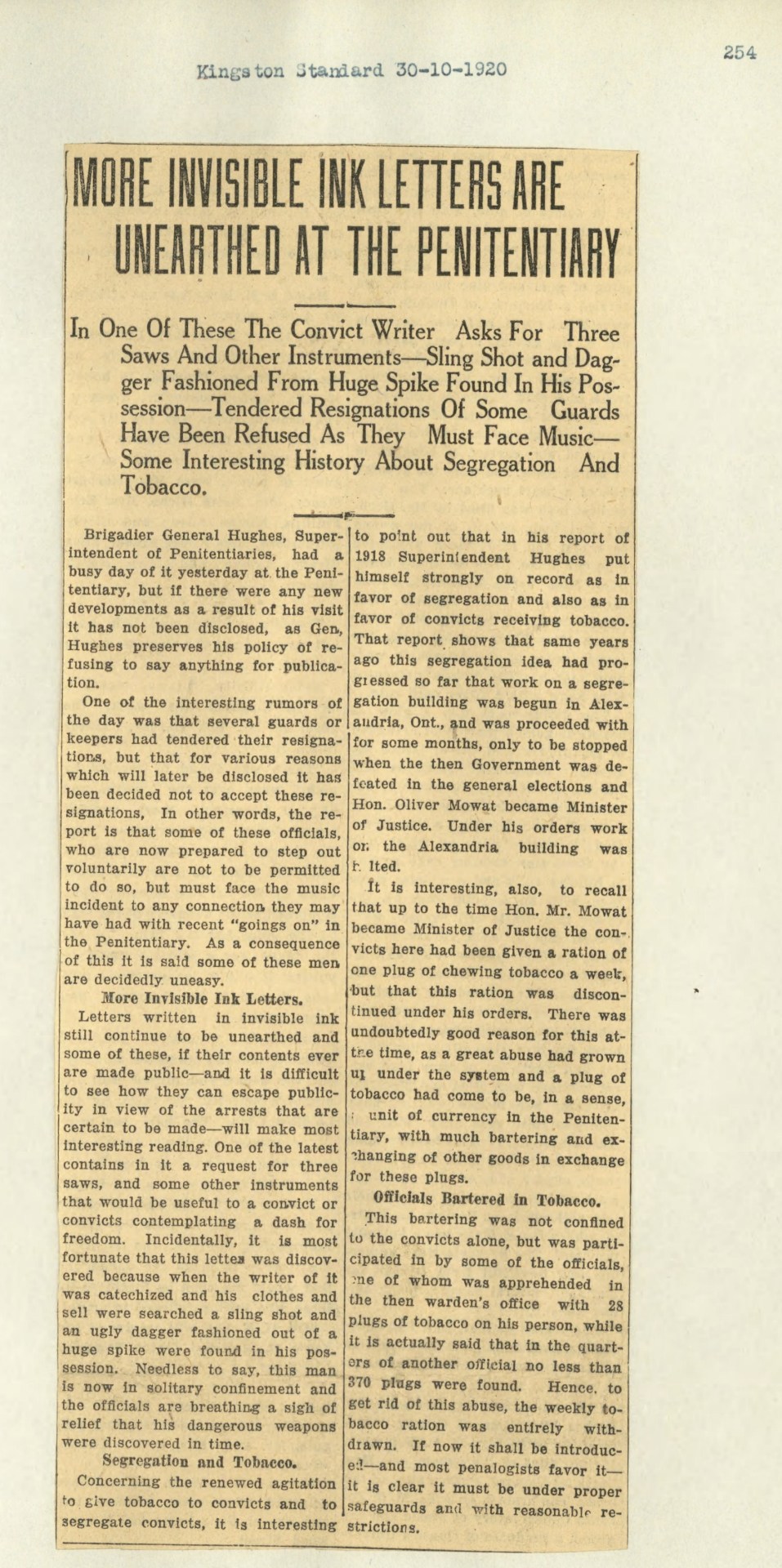
“MORE INVISIBLE INK LETTERS ARE UNEARTHED AT THE PENITENTIARY,”
Clipping from Kingston Standard 30-10-1920
---
In One Of These The Convict Writer Asks For Three Saws And Other Instruments - Sling Shot and Dagger Fashioned From Huge Spike Found In His Possession - Tendered Resignations Of Some Guards Have Been Refused As They Must Face Music - Some Interesting History About Segregation And Tobacco.
----
Brigadier General Hughes, Superintendent of Penitentiaries, had a busy day of it yesterday at the Penitentiary, but if there were any new developments as a result of his visit it has not been disclosed, as Gen, Hughes preserves his policy of refusing to say anything for publication.
One of the interesting rumors of the day was that several guards or keepers had tendered their resignations, but that for various reasons which will later be disclosed it has been decided not to accept these resignations. In other words, the report is that some of these officials, who are now prepared to step out voluntarily are not to be permitted to do so, but must face the music incident to any connection they may have had with recent "goings on" in the Penitentiary. As a consequence of this it is said some of these men are decidedly uneasy.
More Invisible Ink Letters.
Letters written in invisible ink still continue to be unearthed and some of these, if their contents over are made public- and it is difficult to see how they can escape publicity in view of the arrests that are certain to be made - will make most interesting reading. One of the latest contains in it a request for three saws, and some other instruments that would be useful to a convict or convicts contemplating a dash for freedom. Incidentally, it is most fortunate that this letter was discovered because when the writer of it was catechized and his clothes and cell were searched a sling shot and an ugly dagger fashioned out of a huge spike was found in his possession. Needless to say, this man is now in solitary confinement and the officials are breathing a sigh of relief that his dangerous weapons were discovered in time.
Segregation and Tobacco.
Concerning the renewed agitation to give tobacco to convicts and to segregate convicts, it is interesting to point out that in his report of 1918 Superintendent Hughes put himself strongly on record as in favor of segregation and also as in favor of convicts receiving tobacco. That report shows that same years ago this segregation idea had progressed so far that work on a segregation building was begun in Alexandria, Ont., and was proceeded with for some months, only to be stopped when the then Government was defeated in the general elections and Hon. Oliver Mowat became Minister of Justice. Under his orders work or the Alexandria building was halted.
It is interesting, also, to recall that up to the time Hon. Mr. Mowat became Minister of Justice the convicts here had been given a ration of one plug of chewing tobacco a week, but that this ration was discontinued under his orders. There was undoubtedly good reason for this at the time, as a great abuse had grown up under the system and a plug of tobacco had come to be in a sense a unit of currency in the Penitentiary, with much bartering and exchanging of other goods in exchange for these plugs.
Officials Bartered in Tobacco.
This bartering was not confined to the convicts alone, but was participated in by some of the officials, me of whom was apprehended in the then warden's office with 28 plugs of tobacco on his person, while it is actually said that in the quarters of another official no less than 370 plugs were found. Hence, to get rid of this abuse, the weekly tobacco ration was entirely withdrawn. If now it shall be introduced - and most penologists favor it - it is clear it must be under proper safeguards and with reasonable restrictions.
#kingston penitentiary#kingston ontario#penal reform#prison administration#letter smuggling#smuggling contraband#trafficking in prison#tobacco trafficking#corrupt officials#prison guards#dismissed prison guards#superintendent of penitentiaries#w. s. hughes#1920 kp rcmp investigation#crime and punishment in canada#history of crime and punishment in canada#invisible ink
1 note
·
View note
Text
RED VS BLUE: The Ghost Trick AU
His consciousness slowly slips back, but he’s wide awake when he hears a gun cock. In front of him is two men, one in a coat pressed up against the wire fence with his hands up, the other in a suit pointing a shotgun at him.
“So long, kid.”
He tries to stand. He tries to raise his hand. He tries to say something. The guy in the coat is going to die, dammit!
But he can’t move an inch. And they can’t hear him.
Because he’s already dead.
So yeah, the Ghost Trick AU, everyone! I’ve tried to avoid massive Ghost Trick spoilers for those who haven’t played it yet (if you haven’t, go do so, it’s my favourite game for a reason) but in any case, enjoy the casting!
In order of appearance:
Church (Sissel): He’d give you his backstory if he knew what it was. As it currently stands, all he knows is that he’s a recently deceased individual who has a decently good taste in suits and a decently good sense of humor. Okay, maybe that sense of humor is mostly snark, but hey, give him some credit, he’s dead for fuck’s sake. And apparently, being dead comes with the added bonus of “Ghost Tricks”, the power to interact with the living through inanimate objects, travel through telephone lines, and by connecting with the souls of other recently deceased individuals, rewind the last four minutes of their life to avoid their untimely demise. He’s not doing it out of some kind of altruism. He’s just got twelve hours before his soul traverses to the next dimension, and he’d kinda like some help remembering who he is before that happens. That’s all. ‘S only fair.
Detective Dexter Grif (Lynne): Recently promoted to the Detective Division of New Armonia PD, Grif’s something of a loose cannon, and tends to put what he thinks is right before police bureaucracy, which often gets him in trouble. He’s recently gone off the grid again to re-investigate a cold case in which his superior got convicted of murder, which has led to him meeting with Church for information. Which led to him getting shot. Which led to Church saving his life. Which led to him getting arrested for Church’s murder. But as if he’s gonna let a simple arrest get in his way. He’s got a mission to follow. And if he can get food on the way, that’ll be awesome. (Also, don’t call his coat yellow. It’s fucking orange.)
Felix (Nearsighted Jeego): An assassin tasked in ending the life of anyone who knows about “Shisno”. Grif hasn’t the faintest idea what that is, but apparently he’s on that hit list anyway. However, Felix’s overconfidence proves to be a weakness Church is only happy to exploit.
Ray: A deceased soul possessing a desk lamp, Ray is Church’s “Ghost Trick” mentor. Despite ghosts communicating through telepathy, Ray manages to keep most of his thoughts, knowledge, motive and real name included, secret from Church. He requested Church’s help solving the mysterious goings on in New Armonia in return, but frankly, Church only has twelve hours here. He’s got his own mystery to solve, thank you very much.
Chairman Malcolm Hargrove (Commander Sith): The head of Charon Industries, the technological megacorporation of a foreign nation intent on unimaginable power and possibly global domination. Though their technology is far more advanced than any other nation’s, said technology is… “off”, to say the least. And should anyone get in Hargrove’s way, he has his own “security force” to call on.
Counselor Aidan Price (Masked Lieutenant): Hargrove’s immediate subordinate, in charge of carrying out his immediate orders and organizing the orders to others. Never breaks his impassive expression, which can even creep Hargrove out sometimes.
Locus (One Step Ahead Tengo): Another assassin under Hargrove’s employ, much more calm and collected than his rival Felix. He prefers to get ahead of his “prey” and lie in wait in the shadows, rather than tail them and face them directly.
Freckles (Missile): A small fluffy “freckled” dog, technically belonging to “Master Grif”, but much more attached to his roommate, “Master Caboose”. He would do absolutely anything for his masters, and not even an inconvenient death will stand in his way. He’ll make instant friends with just about anybody, so long as they don’t mind a bit (a lot) of barking.
Michael Caboose (Kamila): A ten-year-old kid who’s been in the foster care system since he was very young. He’s lived with Grif and Freckles for about five years, after an unfortunate incident with his previous foster family. He may or may not have witnessed said incident, but always seems to be cheerful nevertheless. He’s not the smartest in school, but he’s pretty good at making convoluted contraptions out of random objects, not always with the permission of his guardian.
Doctor Emily Grey (Superintendent): A former medical examiner of New Armonia PD, now in charge of maintaining and supervising the Zone D junkyard, where Church was murdered. She apparently lives in her office with her pet pigeon Carmen, and spends her free time conducting strange experiments and research in her basement.
Lord Donald Doyle (Justice Minister): The minister of justice in charge of administering the sentences of condemned criminals. It’s a complicated and stressful job, and as such has taken its toll on his health and his relationship with his family. A recent squabble with his wife has resulted in her walking out with their son in tow, which has only worsened his psyche.
Detective Vera Ohio (Detective Blue): A detective at Grif’s precinct, who, well, can get a little too enthusiastic sometimes, especially if she has a chance to prove herself to a superior officer. This enthusiasm doesn’t always equal results, however, so she’s stuck at her current ranking. She’s a little jealous of Grif for making Detective so quickly by comparison.
Detective Ezra Idaho (Detective McCaw): Ohio’s investigative partner, who’s more than used to her antics and usually tries to be her voice of reason, with little success. He’s a little concerned with Ohio trying too hard to impress their superiors, and the ridiculous example set by their inspector.
Doctor Lucy Connecticut (Medical Officer): The medical examiner in Church’s murder case, though no one’s ever seen her on a case before. But, she has her credentials, and she gets the job done, so no questions need to be asked. Right?
Inspector Maddison Carolina (Inspector Cabanela): The head of the Special Investigation Unit, and basically the whole police force second only to the Chief. Though her track record, like her coat, is spotlessly flawless, her manner is jarringly blasé; don’t for a second let this fool you though, she did not get to her position by fuffing around, and heaven have mercy on you if she catches you doing so yourself. Most of the other detectives are wary of her as a result, but she’s surprisingly close to and protective of the newest one, Dexter “Dex” Grif.
Detective Frank DuFresne (Detective Rindge): Oh, did you forget about the other detective at the precinct? You wouldn’t be the first. Whether it be the way he tries not to be in the way, or the way his face disappears under his hat, DuFresne always manages to find a way to be invisible. This isn’t always a hindrance however; as such he’s often assigned to reconnaissance or covert information gathering, a job he excels at. He also excels at it where he’s not meant to, so if anyone knows the low-down on the precinct’s gossip, it’s him.
Officer Dick Simmons (Typical Cop 1): A cop from Grif’s old beat, Simmons would have been promoted to Detective too… if he wasn’t such a nervous wreck in the presence of a superior, which at his rank is always. He tries his best, he really does, but he always seems to stumble over himself at the last minute, and the detectives he works under don’t help either, admonishing him for the slightest mistake and taking the credit when he actually accomplishes something. He also has a massive crush on Grif, which can hinder his mental processing even more. Grif is completely in denial about it, even when others point it out.
Sarge (Chicken Chef): Proprietor, manager and head chef of The Red Base Chicken Kitchen, home of smoky fried chicken, questionable budgeting decisions, and many a husky Southern ballad, all courtesy of the man himself. All of the above factors are an acquired taste, but that doesn’t bother him. As far as he’s concerned, he’s living the dream.
Officer Ben Matthews (Officer Bailey): One of six guards patrolling Stella Nova Penitentiary, Matthews is a stickler for the rules 99% of the time, but in spite of himself, there are two people he can never say no to; one is Grif, and the other is his fellow officer Bitters. The stress of trying to keep the latter in line causes him a lot of pent up energy that… occasionally has to be let out. In hilarious fashion. Bitters has videos.
Officer Antoine Bitters (Other Officer): Once upon a time, Bitters was a hopeful, enthusiastic young police cadet raring to take on the bad guys and protect the streets of New Armonia. But now he’s stuck on guard duty in the most uneventful prison ever, and his attitude is beginning to match his name. With not much “guarding” necessary, he spends most of his time creating his own entertainment, often at Matthews’ expense.
Officer John Andersmith (Prison Guard 1): Like Matthews, Andersmith is a stickler for the rules, but he’s immune to Bitters’ mind tricks, and everyone’s learned to keep the two apart if they’d like to finish the day without a headache. Even if he wasn’t such a stickler, the prisoners aren’t likely to try and bully him; he’s six foot, jacked and pretty good with a firearm.
Mina South (Spiky): Lead guitarist and singer of rock band The Dakotas, South’s music career hit a screeching halt when she was arrested for leaking government secrets during a concert being aired live around the nation. She’s the most abrasive of the inmates of Stella Nova, but her attitude wins her nothing, especially from Andersmith.
Peter Maine (Sausage Head): A man of few words, Maine’s actions speak for him; he’s in Stella Nova for breaking in to the New Armonia Metro PD and holding the Chief Commissioner at flamethrower-point. Though he may seem intimidating, in reality he’s easily pushed around, particularly by fellow inmate South.
Detective David Washington (Detective Jowd): The third and quietest of Stella Nova’s inmates, Washington used to be New Armonia’s, and perhaps even all of Chorus’, best detective, Carolina’s best friend, and Grif’s mentor, until he was convicted for the murder of his partner Tucker. Though Grif maintains his innocence, he himself has accepted his guilt and his sentence. His detective skills haven’t blunted, though, so little happens within the prison walls that he doesn’t know about.
Officer Charlie Palomo (Prison Guard 2): The newest of the six guards in Stella Nova, Palomo’s innocent worldview has yet to be tarnished by the harsh realities of his job, or the exasperation of his colleagues. If anyone’s going to start a casual conversation, with a colleague or with an inmate, it’ll be Palomo, and he rarely gets the hint to keep his mouth shut unless explicitly told.
Chief Vanessa Kimball (Chief): Though only in the top spot for a few years, Kimball is an instant magnet for respect, even from top investigators such as Carolina. In fact, she and Carolina have struck up a rapport in the wake of Washington’s arrest, and she’s the only one Carolina will open up to. All the other members of the force, however, shouldn’t dream of getting casual with her.
Detective Franklin Donut (Memry): Once the Special Investigation Unit honed in on the location of an illicit deal taking place at The Red Base Chicken Kitchen, they sent in their undercover operative Donut in the guise of a recently hired waiter. He’s not too undercover, though; the bubbly, flirtatious attitude and unwitting innuendos are all the real him, which often makes his workmates, at the restaurant and the PD, very, very uncomfortable.
Girlie (Beauty): One of two operatives of Charon taking part in the deal at Red Base, though she’s beginning to regret agreeing more by the minute. Even if her “sixth sense” makes her invaluable for the job, her teammate is intolerable, and the other party is taking forever to turn up.
Sharkface (Dandy): Girlie’s teammate, Sharkface also has distaste for their assignment, though it has more to do with the extent of work he has to do than the company. If anything, the company is all that makes this assignment worth it, though she greatly disagrees.
Lopez (Bartender): The barman of The Red Base Chicken Kitchen, Lopez is very, very jaded from his job. His boss is borderline insane, the waiter is driving him insane, and no one understands a word he says anyway. The only thing that keeps him there is the knowledge that, at the very least, his work is appreciated.
Officer Katie Jensen (Prison Guard 3): As the closest in age to Palomo, and the one who can tolerate his company the best, Jensen is usually the guard on the same round as him. They can often be found chatting in the halls until they’re needed, at which point she’ll also be one dragging him back to work.
Officer Averil Volleyball (Prison Guard 4): The first time anyone sees Volleyball in uniform, they swear she’s a kissogram, not an actual officer, and her flirtatious manner doesn’t help. But anyone who actually tries to have their way? Those handcuffs aren’t for play, buddy.
Lavernius Tucker (Alma): Washington’s partner, well-known among his colleagues for being the one that can make the usually stoic detective crack the dorkiest smile ever. Or, well, was well-known, until Washington was charged with his murder. Could their relationship really have gone that sour that quickly?
The only characters of import that I have yet to cast are Doyle’s wife and son, and the hippy that makes DuFresne’s job harder than usual. Any ideas from those who know both franchises?
(Also, please don’t judge me for my choice of given names of the Freelancer and Chorus characters. I put a lot of thought into them.)
#Red vs Blue#Ghost Trick#AU#was going to tag all the characters#but tumblr won't let me bc there's too many#i'll just tag the ships then#grimmons#tuckington#kimbalina#sharkgirl?#I couldn't think of a better name
14 notes
·
View notes
Text
More than 50 dead, 16 decapitated in Brazil prison riot
Authorities said the riot involved rival criminal gangs who took at least two penitentiary officers hostage as they battled one another.
Jarbas Vasconcelos, the superintendent of the penitentiary system in the state of Para, said 16 of the 52 inmates that died in the Altamira prison on Monday were decapitated.
The incident is the latest in a string of deadly violence that has plagued Brazil's prisons in recent months.
In May, 55 inmates were killed in gang-related riots at four prisons in western Brazil.
The local prison authorities said at the time the deaths were a result of violent clashes among rival factions within the same drug gang, known as the Family of the North. Human rights groups have accused the government of doing too little to prevent the violence at prisons that have become recruitment centers for gangs -- and even facilitating clashes by allowing the cells to become overcrowded.
The clashes pose a challenge to the new far-right President Jair Bolsonaro, but could also end up giving his approval rating a boost as he is seen as tough on crime and has previously vowed to crack down on criminal gangs and prison violence.
https://www.cnn.com/2019/07/29/americas/brazil-prison-riots-intl/index.html
12 notes
·
View notes
Photo

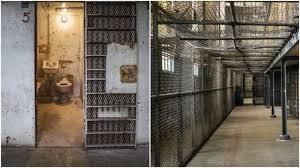
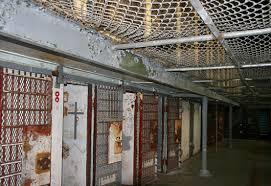
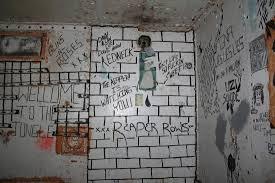
West Virginia Penitentiary
The West Virginia Penitentiary, Moundsville, with its striking stone facade and Gothic castle-like style opened in 1876. The structure was originally built for 480 prisoners, but by the early 1930s it housed a total of 2,400. At times, three prisoners would be assigned to one of the tiny five by seven cells.
In 1929, construction to expand the prison began, but because of the shortage of iron due to the war, it was not completed until 1959. In 1986, the West Virginia Supreme Court ruled the small cells were cruel and unusual punishment and ordered the prison to be closed. In 1995, the last prisoners were transferred out of Moundsville.
In the late 1800s Moundsville took over all executions for the state. In all, 85 men were hung and nine electrocuted. The executions were only a small part of the violent past at Moundsville. Suicide, murder and violent punishments contributed to the death of hundreds of inmates. Because of poor record keeping, the exact number of inmates who died violent deaths while incarcerated at Moundsville is unknown.
In 1886, prison officials were exposed for hiding whips and other items, used to punish incorrigibles, from the state inspectors. But after one of the superintendent’s resigned from the prison, he did a tell all interview with The Enquirer, exposing the violence and torture on inmates by prison officials. The following are excerpts from the interview describing the atrocities:
Kicking Jenny
It is an instrument invented and built in the prison. It is made somewhat in the shape of a quarter-circle, with the highest end about three or four feet above the platform upon which it is set. The prisoner is stripped naked and bend over upon the machine. His feet are fastened to the floor with ropes, while his hands, which are stretched over the upper end, are tied with roped attached to small blocks, by which a tension so strong that the frame of the prisoner can almost be torn in two can be made with a slight pull.
After the prisoner is placed in position the Superintendent, or whoever does the whipping, takes a heavy whip, made of sole leather, two pieces of which, about three feet long, are sewed together and the ends scraped slightly rounding, the lash being three inches broad at the handle, tapering to a point. With the whip the prisoner is beaten until he is almost dead, or the strength of the man who is doing the whipping gives out.
The Shoo-Fly
That infernal kicking Jenny was not the only instrument of torture. There was the shoo-fly, an instrument so arranged that the victim could be placed with his feet in the stocks, his arms pinioned and his head fastened so that he could not move it. Then someone would take the hose and turn the water full upon the prisoner’s face. This was kept up until the victim was partly strangled to death.
Imagine a man receiving a stream of water from an inch nozzle full in the face without the power of changing his position; then think of that stream being ice-cold water, and you can form an idea. According to popular legend, the prison buildings were built on an old Native American burial ground. Some believe that the legend coupled with its violent past is why it is haunted.
With its violent past, deplorable conditions and two major riots, Moundsville Penitentiary is a popular destination for those who study paranormal activity. Some claim that the prison is plagued with what is called, residual haunting, which are defined as a replay of a tragic event from the past.
There are several areas in the prison known as hot spots where an unusual amount of paranormal activity reportedly occurs. Such places include: the Chapel, shower cages, Death Row, the Sugar Shack, which was a recreational area and the North Wagon Gate which is where death row inmates were taken to be hung before the facility used the electric chair.
One other area known for strange occurrences is the circular entrance gate which was used to separate arriving inmates from the warden’s living quarters. According to reports, the circular cage turns periodically by itself, giving the impression that the spirits of criminals are still arriving at the prison.
4 notes
·
View notes
Photo

So,
Jeff Jones could tell something was wrong.
I’d been covering the Kootenay Lake School Board for over a year, sitting through torturous school board meetings every two weeks, and the soft-spoken superintendent had become my primary source and subject for School District 8 stories. I’d developed a type of relationship with him I called ‘slap and kiss’: whether I was covering the grand opening of a playground or taking his administration to task for its financial decision-making, either way he had to take it.
“I can’t believe he didn’t yell at me,” I told Greg, after hanging up with Jeff one day. We’d just published a scathing article accusing his office of registration negligence, but he hadn’t lost his cool at all.
Greg nodded. “That’s why people like that get jobs like that. Because if you can’t handle a reporter, then chances are you can’t handle hundreds of screaming parents either.”
In my initial Star profile, Jeff talked a lot about transformational education and the need for a significant overhaul to the system. Every chance he got he was telling me about new innovations, fun community projects teachers had taken on or partnerships with the community that were beginning to bear fruit. He had a pseudo-religious zeal for SD8, which I respected, and a progressive worldview that centered around the UN’s Sustainable Development Goals. In other words: he was my kind of dude, and I trusted him both in a professional context and as a person.
So when I found out that my former professor Steven Galloway had lost his position at UBC in November 2015 for something vaguely sexual-sounding, and witnessed the online carnage as my literary contacts duked it out online over his guilt or innocence, it was Jeff who noticed how upset I was. I’d called him about something unrelated, but he interrupted that to ask what was going on with me. My voice was shaking.
“It’s just this Galloway thing,” I told him. “Have you been on Twitter?”
“No, I don’t know what you’re talking about.”
“Well, he was my thesis advisor during my Master’s, right? And now there’s some sort of accusation or something, some deal about sexual assault. And now all my friends all over the country are fighting. It’s getting like epic nasty.”
“You sound upset, Will. Are you okay?”
“I dunno, it’s just bringing up some stuff. I went through something similar when I was young, like a sex scandal like this, with my youth pastor.”
“Do you need someone to talk about this with?”
I blinked for a moment. It seemed like a strange offer, but it was one I was happy to accept. I knew that Paisley wasn’t the right person to talk about this with, though I’m sure she would have a fiery opinion, and none of my other friends even knew who Galloway was. I had no idea what to think of the situation, but I couldn’t believe how quickly the pitchforks had been bared. Some of my friends were ready to crucify the guy, without due process, right there in public.
“Yeah, could I swing by around 4 maybe?” I asked.
“I’ll be here at the board office. That works,” he said. “And maybe you should stay off Twitter for a bit.”
A few hours later I arrived at his office with Buster’s leash tangled around my leg. When I was flustered it was always better to have either Muppet or Buster nearby, so I could fixate on their needs rather than mine. Jeff came out to meet me and ushered me back into his office. He shut the door and sat across a small table from me while I held Buster in my lap, shaking. He was broad-shouldered, with a pumpkin belly like mine, and glasses that routinely slipped down his pointy nose. Sometimes he reminded me a little of a kind, G-rated version of Danny DeVito.
As Jeff folded his hands in front of him, I explained everything I knew about the Galloway situation so far. I described how people were acting online, making lists of people to ostracize and threatening to burn books. It was some of the ugliest shit I’d ever seen.
“I mean, the guy’s not my best friend or anything. I had my issues with him. But it’s not right, you know? They’re acting like he’s some pedophile rapist or something.”
“And there’s no criminal charges?”
“I don’t know, maybe they’re coming? Right now it’s just a bunch of talk, like people coming forward or whatever. My friend Sierra is involved, and she’s huge to me. She handed my thesis in for me when I was on the East Coast, so she’s basically the reason I have my MFA at all.”
Jeff frowned. “This is why I tell all my teachers: you have to set strict boundaries for yourself right at the beginning of your career, and then never cross them. It’s a little different in a post secondary institution, of course, but the same principle applies. The line between educator and student should never be crossed.”
“The thing is, this is what fucked up my church.”
“Your church?”
“When I was growing up, I was like an intense bible thumper, right? And I had this youth pastor that I absolutely worshipped, the dude was like a father figure to me, and then he got arrested down in Mexico for molesting a teenage boy. Spent a decade in a penitentiary down there. It absolutely destroyed our community, and I’m not even a Christian anymore.”
“These situations can be so destructive. But you need to focus on yourself, and on your own mental health. My advice would be to stay off social media for a while, focus on positive things, spend time with this little guy.”
I looked down at Buster, and gave him a pet. “I just get a little melodramatic sometimes. This shit is just so overwhelming.”
Jeff leaned back in his chair and straightened his tie. He told me a lengthy story about an experience he had with a teacher who had been accused of wrongdoing at Elephant Mountain Secondary. It had happened more than once in his career, and there was always a balance to find between respecting the teacher’s privacy and ensuring the safety of the students. Of course not every allegation was true, so it was integral not to drag someone’s name through the mud before anything had been proven. He told me it sounded like UBC had made a major error in judgment, and theorized that they would eventually pay for it. Institutions were still grappling with the right way to deal with sexual assault allegations, and there was no right answer. In the meantime we were left with all this grueling drama and collateral damage.
“I appreciate you taking the time to chat with me. I’ve been feeling a little fragile mental health-wise lately,” I told Jeff. “It means a lot.”
“You have a big heart, I think everybody sees that,” Jeff said, clapping me on the shoulder. “Focus on your nice little family and you’ll be just fine. And I really do think you should take a break from Twitter.”
The Kootenay Goon
1 note
·
View note
Text
Police investigating sudden death of Labrador inmate found in cell
Labrador police are investigating the sudden death of a 22-year-old inmate.
Happy Valley-Goose Bay RCMP said today the man from Natuashish was found unresponsive in his cell on Thursday.
Police say he was transported from the Labrador Correctional Centre to hospital, where he was pronounced dead that day.
The 22-year-old's death was the second to occur at a provincial jail since November, when 33-year-old Jonathan Henoche died inside Her Majesty's Penitentiary in St. John's.
Police are investigating Henoche's death as a homicide.
A 2019 investigation into the deaths of four inmates, led by a retired police superintendent, concluded there was a mental health crisis within the province's largest detention facilities.
This report by The Canadian Press was first published Feb. 7, 2020.
from CTV News - Atlantic https://ift.tt/2vZvdNA
1 note
·
View note